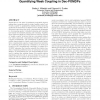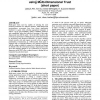12 search results - page 2 / 3 » Optimal temporal decoupling in multiagent systems |
130
click to vote
IAT
2005
IEEE
15 years 5 months ago
2005
IEEE
This paper presents a self-organizing cognitive architecture, known as TD-FALCON, that learns to function through its interaction with the environment. TD-FALCON learns the value ...
117
Voted
AMET
1998
Springer
15 years 4 months ago
1998
Springer
We present an approach to the bid-evaluation problem in a system for multi-agent contract negotiation, called MAGNET. The MAGNET market infrastructure provides support for a variet...
104
click to vote
ATAL
2007
Springer
15 years 6 months ago
2007
Springer
Decentralized Markov Decision Processes (DEC-MDPs) are a popular model of agent-coordination problems in domains with uncertainty and time constraints but very difficult to solve...
132
click to vote
ATAL
2011
Springer
14 years 7 days ago
2011
Springer
Researchers in the field of multiagent sequential decision making have commonly used the terms “weakly-coupled” and “loosely-coupled” to qualitatively classify problems i...
ATAL
2008
Springer
15 years 2 months ago
2008
Springer
Multi-agent teams must be capable of selecting the most beneficial teammates for different situations. Multi-dimensional trustworthiness assessments have been shown significantly ...


